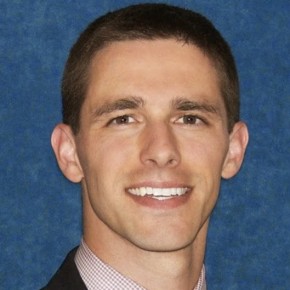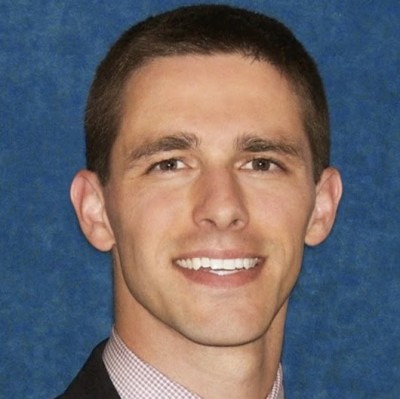Article by Luke Murray, MD | “Doctor’s Orders” curated by editor Sasha Yakhkind
At 8 a.m. every morning of the work week, I show up to class and make every bit of a dramatic entrance — slapping high fives to people in the front row, cracking a joke at He-Man’s (the class ‘buff guy’) expense, taking a moment to survey the classroom for an empty seat (next to people I haven’t sat with yet), throwing long distance secret handshakes to anyone from my lab table that’s paying attention … and smiling as big as I can stand it. And though this behavior is admittedly odd and seemingly manic, it is actually a completely honest expression of everything that my smile represents. Some of my classmates have noticed and asked me about it. At 2 p.m. on October 10, one of Dr. Rudy’s former patients reminds me of the substantial and universally relevant answer to why I am the way I am.
Mr. C was an attorney from Michigan who had, in the span of 59 short years, experienced a spinal fusion in his teens, complete reconstructive surgery on his knee in his 20s, and most recently a stroke in his mid-50s. In a single hour, through occasionally subdued tears on both sides of the podium, he ultimately communicated more powerfully than any words could, the message that no amount of “bad cards” dealt in life must result in the forgoing of its enjoyment. This “have a positive attitude” message is of course extremely worn out, but to be more specific — and hopefully more applicable to our own lives — I was reminded of the things I do that allow me to burst through the door every morning and behave like a person who is genuinely glad to be here.
Mr. C’s good attitude was a decision, plain and simple, just like his automobile, tie and lunch that day. Whenever he came across a situation, he decided to focus on the aspects that affected his attitude in a positive way. “I’m very fortunate … I’ve been very lucky” were all honest statements because he was choosing to give his attention to things that made him feel that way. He spoke of his wife, his ability to talk, walk and think, and even the fact that he was alive, all of which made him sincerely feel like a blessed man and therefore have a ‘positive’ attitude.
We, in the same way, can choose to focus on things that make us happy (our family, friends, health or youth) as well. We come across a million situations every day that provide us with a choice to focus on the ‘good’ or ‘bad’ in them — our only task is to focus on what’s good. Seriously, try this for a day: choose not to think a negative thought. It’s not only possible, it’s really the only way that you can have a truly positive attitude. However, it can definitely be difficult to have a good attitude, or to focus on things that are happy, when we spend all day on something that isn’t intrinsically ‘fun’ and that despite our best efforts, we may not be ‘succeeding’ at (here’s looking at you, anatomy). Thankfully, Mr. C addressed this as well.
When I call home to talk to my mom, she wants to know how I’m doing in school. The question presupposes answers like ‘well,’ ‘poorly,’ and ‘fantastic,’ but what is implied in each one of these responses is my performance in relation to some predetermined standard. The metrics in this case are my grades, and the quantifiable standard could be my current standings with the class, former grades, former class rankings and so forth. We all choose a benchmark against which we compare our current academic performance. Again, since medical school represents, for most of us, the vast majority of the time and energy we invest on a daily basis, our definition of how ‘well’ we’re doing unavoidably affects our self-image, self-esteem and our attitude. However, in the real world, we use these standards as well — job title, education, salary, and they can exert just as much influence over our attitude if we let them. What Mr. C taught us on Wednesday was to throw out the metrics and the reference points completely.
Mr. C was an athletic, articulate, multilingual, practitioner of law and is currently none of these things — so using external metrics or references would be literally crippling to his attitude. What he demonstrated is each person’s ability to create his or her own frame. He made his own internal, controllable standards and stayed rooted to them. So how do you focus on the good when your grades are worse than they’ve ever been and worse than everybody else’s despite giving it 100 percent? Choose a different way to define success that you can control: hours spent studying per day, effort, enjoyment of learning. Whatever you choose, make it something completely under your control, the determination of your success, and something that ultimately makes you happier.
So why do I smile? Well, because I’m Luke, and that’s how God made me, but also because I choose every morning to focus on the fact that I’m living a dream I’ve been striving towards for years (and so are my fellow students, by the way), and because I’m way more focused on how much better I’m getting at the process of learning than I am at my grades. In a nutshell, I’m choosing my attitude, by choosing my focus, and I’m choosing my focus by redefining my frame.
Finally, and more than anything: when Mr. C choked up while talking about his two-year limp after knee surgery, or his frustrations in stroke rehabilitation, I was reminded of not just why I smile, but why I chose to go to medical school in the first place. That’s the kind of impact I’ll be able to make on someone someday, and it’s a privilege that pilots, cooks, CEOs and many other professionals don’t have. So whether you choose to learn from Mr. C’s talk or not, knowing that you will soon have that kind of impact on someone every day should put a smile on your and each of our faces.
 Dr. Luke Murray, MD is a first year family medicine resident and an entrepreneur, currently working on a book for med students going through tough times. Upon completion of residency, he plans to continue helping medical students through the challenges they face during their training. Eventually, he would like to practice medicine internationally for a few years and then start or join a company in the medical education or international medicine space.
Dr. Luke Murray, MD is a first year family medicine resident and an entrepreneur, currently working on a book for med students going through tough times. Upon completion of residency, he plans to continue helping medical students through the challenges they face during their training. Eventually, he would like to practice medicine internationally for a few years and then start or join a company in the medical education or international medicine space.




